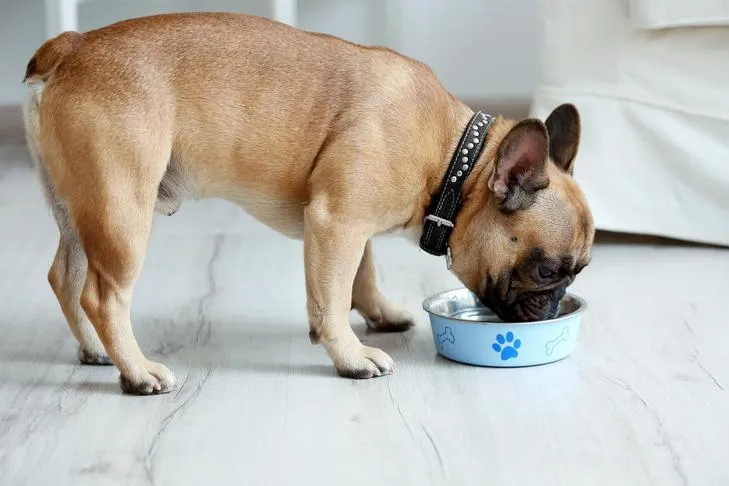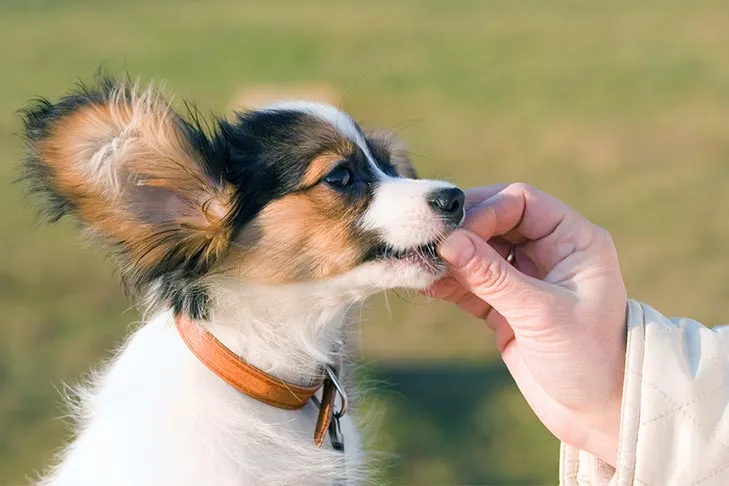Many dog owners often wonder which human foods are safe to share with their furry companions. When considering “What Human Meat Can Dogs Eat,” it’s crucial to understand that while some meats and other human foods offer nutritional benefits, others can be harmful or even toxic. This comprehensive guide will delve into various human-consumed meats and other common foods, detailing what your dog can safely enjoy in moderation, along with essential precautions to ensure their health and well-being. Always remember that a dog’s primary diet should consist of high-quality dog food, and human foods should only be given as occasional treats.
Navigating the world of dog nutrition can be complex, especially when you’re looking for ways to treat your pet with something extra. While a balanced commercial dog food is paramount, certain human foods can supplement their diet beneficially. However, it’s vital to differentiate between healthy additions and dangerous ingredients. Understanding these distinctions is key to preventing health issues. For general guidance on what to avoid, you might find it helpful to read about what are you not supposed to feed your dog.
Safe Human Meats and Proteins for Your Canine Companion
When thinking about “what human meat can dogs eat,” several common protein sources stand out as safe and even beneficial when prepared correctly. These offer essential amino acids and nutrients vital for your dog’s health.
Pork: A Digestible Protein Source
Pork is generally safe for dogs and is considered a highly digestible protein. It’s packed with amino acids, making it a good addition to your dog’s diet in moderation. Some pets may even find pork less likely to cause allergic reactions compared to other proteins. However, it’s important to remove all excess fat and skin, as well as any bones, before serving. Cooked pork should be plain, without any seasonings like salt, onions, or garlic, which can be toxic to dogs.
Turkey: Lean and Nutritious
Turkey is another excellent human meat option for dogs, provided it is cooked thoroughly and served plain. Ensure all bones, skin, and excessive fat are removed. Poultry bones can splinter easily, posing a choking hazard or causing internal injuries. Like pork, turkey should be free of any seasonings, onions, or garlic. It’s a lean protein that can be a healthy treat, especially during holidays, but always in small, controlled portions.
Fish: Rich in Omega-3s
Certain types of fish, like salmon and sardines, offer significant health boosts for dogs due to their high content of good fats and amino acids. Salmon, when fully cooked, is an excellent source of protein and vitamins, promoting joint and brain health and boosting the immune system. Sardines are particularly beneficial as their soft, digestible bones provide extra calcium.
However, caution is paramount. Never feed your dog uncooked or undercooked fish, as it can contain parasites that cause severe illness, including vomiting, diarrhea, and dehydration. Always ensure fish is fully cooked and cooled, and, with the exception of sardines, meticulously remove all tiny bones. Limit fish intake to no more than twice a week.
Ham: An Occasional Treat
While ham is generally considered safe for dogs, it’s not the healthiest option due to its high sodium and fat content. A small, unseasoned piece as an occasional treat is acceptable, but it should not become a regular part of their diet. Excessive amounts can lead to weight gain or digestive issues. Always choose lean cuts and avoid any glazed or heavily processed ham.
Eggs: A Protein Powerhouse
Fully cooked eggs are a wonderful source of protein for dogs and can even help soothe an upset stomach. They are rich in vitamins, minerals, and amino acids. However, never feed raw egg whites, as they can interfere with biotin absorption, potentially leading to a biotin deficiency. Always cook eggs thoroughly, whether scrambled, boiled, or fried without added oils or seasonings, before offering them to your pet.
Shrimp: A Low-Fat Delicacy
Shrimp, when fully cooked and completely de-shelled (including the tail, head, and legs), can be a fine occasional treat for your dog. They are low in fat, calories, and carbohydrates, while being high in antioxidants, vitamin B-12, and phosphorus. Just a few shrimp every now and then can be a nutritious snack.
Tuna: Omega-3 Benefits in Moderation
Cooked, fresh tuna in small amounts can be a good source of omega-3 fatty acids, which support heart and eye health. Canned tuna, if packed in water (not oil) and unsalted, can also be given sparingly. However, canned tuna may contain small amounts of mercury and sodium, so moderation is key to avoid excessive intake. Avoid any tuna with added spices.
Other Safe and Beneficial Human Foods for Dogs
Beyond meats, several other human foods can provide health benefits and act as safe treats for your dog.
Bread: A Simple Treat
Small quantities of plain bread are generally harmless for dogs, provided it contains no spices, especially no raisins or xylitol, which are highly toxic. While bread offers no significant health benefits and is high in carbohydrates and calories, a small piece of plain, ideally homemade, bread can be an acceptable treat. Store-bought bread often contains unnecessary preservatives, so it’s best avoided if possible.
Cashews: Nutritious Nuts
Cashews are safe for dogs in small quantities, offering calcium, magnesium, antioxidants, and proteins. They are lower in fat than many other nuts, but too many can still contribute to weight gain. Always offer unsalted cashews as an occasional treat.
Cheese: A Popular Dairy Snack
Most dogs can enjoy cheese in small to moderate amounts, provided they are not lactose intolerant (a rare but possible condition). Lower-fat varieties like cottage cheese or mozzarella are better choices due to their high-fat content. Many dogs also enjoy dog-specific chews made from dried cheese.
 All American Dog resting its head on the kitchen table looking at cheese.
All American Dog resting its head on the kitchen table looking at cheese.
Coconut: Tropical Health Boost
Coconut contains lauric acid, which can help combat bacteria and viruses, improve bad breath, and aid in clearing up skin conditions like hot spots, flea allergies, and itchy skin. Both coconut milk and coconut oil are safe for dogs. Ensure the furry outer shell is removed to prevent choking.
Corn: A Common Dog Food Ingredient
Corn is a staple in many dog foods and is safe for dogs. However, the cob is indigestible and can cause intestinal blockages, so always serve corn off the cob. It’s a good source of carbohydrates and fiber.
Honey: Natural Sweetener with Benefits
Honey is packed with nutrients like vitamin A, potassium, calcium, magnesium, copper, and antioxidants. Small amounts can potentially help with allergies by introducing pollen to their system, building immunity. It can also be used topically for minor burns and superficial cuts.
Milk: Proceed with Caution
While dogs can drink milk, it’s best to be cautious as some dogs are lactose intolerant and may experience digestive upset. If your dog tolerates it, a small amount is fine, but owners should be aware of lactose intolerance symptoms. Water remains the best hydration choice.
Peanut Butter: A Beloved Treat
Raw, unsalted peanut butter can be an excellent source of protein, heart-healthy fats, vitamins B and E, and niacin for dogs. Always read labels carefully to ensure it does not contain xylitol, a sugar substitute that is highly toxic to dogs.
 French Bulldog eating from a bowl at home.
French Bulldog eating from a bowl at home.
Peanuts: Good Fats in Moderation
Unlike almonds, peanuts are safe for dogs. They offer good fats and proteins beneficial for your dog. However, give them in moderation to avoid excessive fat intake, which can lead to pancreatic issues. Always choose unsalted peanuts, as too much salt is difficult for dogs to process.
Popcorn: An Air-Popped Snack
Unsalted, unbuttered, air-popped popcorn can be an acceptable treat in moderation. It contains riboflavin and thiamine, which support eye health and digestion, along with small amounts of iron and protein. Ensure all kernels are fully popped to prevent choking hazards.
Quinoa: A Healthy Grain Alternative
Quinoa is found in some high-quality dry dog foods and is a healthy grain. Its strong nutritional profile makes it a beneficial alternative to corn, wheat, and soy, which are often used in kibble.
 Samoyed puppy laying in the grass outdoors.
Samoyed puppy laying in the grass outdoors.
Wheat or Grains: Not Always the Enemy
Dogs do not necessarily need a grain-free diet. Grains like wheat and corn are good sources of protein, essential fatty acids, and fiber. If your dog has specific allergies, avoiding grains might be necessary, but this depends on individual sensitivities. Consult your veterinarian for personalized dietary recommendations.
Yogurt: Probiotic Benefits
Plain yogurt can be a perfectly acceptable snack for dogs. The active bacteria in yogurt can help strengthen the digestive system with probiotics, provided your dog can digest dairy. Always choose plain yogurt without added sugar or artificial sweeteners, especially xylitol.
 Papillon puppy gently taking a treat from a hand.
Papillon puppy gently taking a treat from a hand.
Human Foods Dogs Cannot Eat
Beyond understanding what human meat can dogs eat, it’s equally, if not more, important to know which human foods are strictly off-limits due to their toxic nature. Some common human foods can cause serious illness, organ damage, or even be fatal for dogs. These include, but are not limited to, chocolate, grapes and raisins, onions, garlic, avocado, xylitol (found in many sugar-free products), alcohol, and macadamia nuts. For a comprehensive list and detailed explanations of harmful foods, you should review resources like what foods should you never feed a dog and what in onions is bad for dogs.
Always keep these dangerous foods out of your dog’s reach. If you suspect your dog has ingested something toxic, contact your veterinarian or an emergency animal hospital immediately. Early intervention can make a significant difference in such situations. For specific concerns about a dog that might be unwell, understanding what to give sick dog to eat can also be vital information.
Conclusion
Sharing human foods with your dog can be a rewarding experience, but it requires careful consideration and knowledge. While some human meats and other foods, like properly cooked pork, turkey, fish, and eggs, along with plain bread, cashews, cheese, and yogurt, can be safe and nutritious treats, moderation and correct preparation are key. Always prioritize your dog’s regular, high-quality dog food diet. Before introducing any new human food, especially if your dog has existing health conditions or allergies, it’s always best to consult your veterinarian. Their guidance will ensure that any treats you offer contribute positively to your dog’s health without risking their well-being. By understanding “what human meat can dogs eat” and other safe options, you can treat your beloved pet responsibly and keep them happy and healthy.
